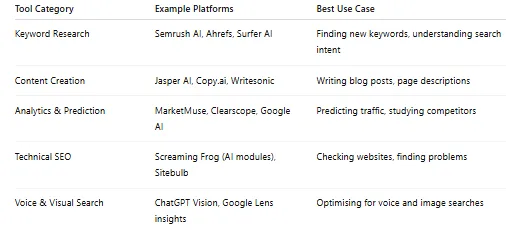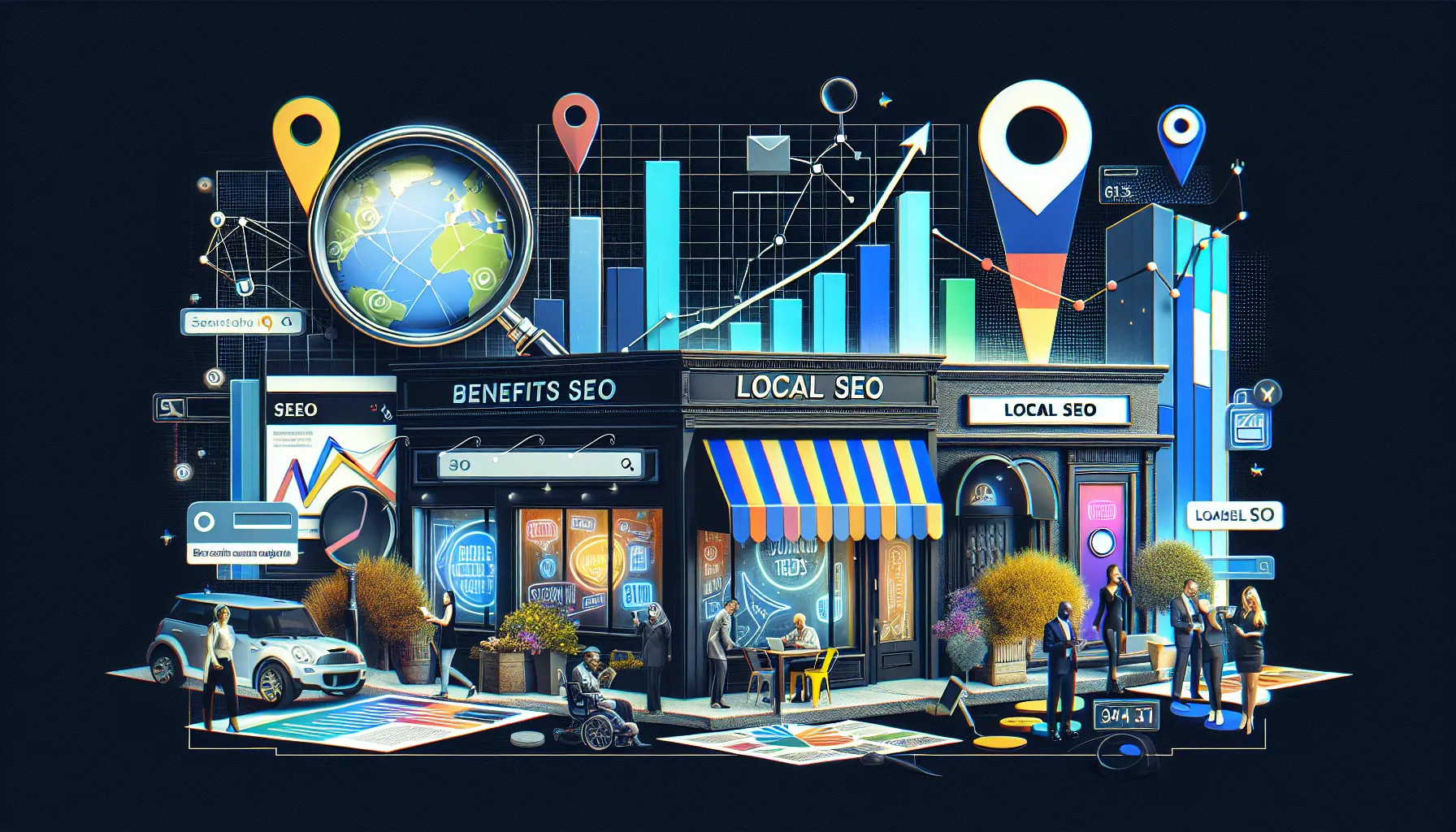Search engine optimisation (SEO) is an ever-evolving field. In the early 2000s, the primary measure of success was the frequency of keyword placement on web pages. By 2010, the emphasis shifted toward acquiring high-quality backlinks and resolving underlying website issues.
In 2025, we're now seeing AI-powered SEO take the lead.
Innovative technology is transforming how marketers enhance their websites. It's also changing how search engines understand what people want when they search for information. For business owners, this means learning to utilise these intelligent systems. You'll also want to utilise AI tools to gain a deeper understanding of your customers.
This guide covers the current role of AI in SEO, its benefits, the tools available, and future trends that matter for your business.
Understanding AI in SEO
AI in SEO refers to the use of intelligent computer programs to automate tasks that would previously have required manual effort. These programs can analyse millisecond pieces of information in seconds. Instead of spending your day analysing search data, AI does it for you.
AI helps with SEO in several ways:
- Understanding search intent: recognises what people truly want when they search. For example, it recognises the distinction between "buy running shoes online" (an intent to purchase) and "best running shoes for beginners" (a search for information).
- Creating reports automatically: AI tools gather your ranking information, website traffic, and sales data into easy-to-read reports.
- Personal suggestions: AI predicts which content will work best for specific users.
What is AI-Driven Content Creation?
AI content creation utilises intelligent programs to generate text, page descriptions, frequently asked questions, and even complete blog posts. These programs learn from successful content, copying what works well.
Here's what it can do:
- Page descriptions can be written for hundreds of products quickly and efficiently.
- Blog outlines can be created with suggested keywords included.
- Content updates can happen automatically, keeping old posts fresh and valuable.
However, AI-generated content works best when reviewed and edited by a real person. Content generated solely by machines can sound repetitive, contain errors, and fail to convey your business personality.
How AI Makes Keyword Research Better
Finding the right keywords is essential for SEO, but manually analysing them often misses valuable opportunities. AI solves this by analysing vast amounts of data, search results, and what your competitors are doing.
AI keyword research tools can:
- Find long phrases people search for before they become popular.
- Connect related terms (like grouping "AI SEO" with "machine learning SEO").
- Track seasonal trends and spot rising keywords.
Example: A shoe store might discover through AI that "eco-friendly sneakers 2025" is becoming popular. This lets them create content before everyone else catches on.
To learn more about this, check out our detailed article: AI Tools for Keyword Research: Revolutionising SEO.
AI for Predicting SEO Results
Predictive SEO goes beyond showing what happened in the past. It tries to predict what will happen next.
Key uses include:
- Traffic prediction: AI estimates when your website might gain or lose visitors.
- Algorithm update preparation: By watching how search engines behave, AI guesses potential ranking changes.
- Click prediction: AI calculates how likely people are to click on your titles and descriptions compared to competitors.
For example, an AI platform might alert you that a competitor's article on "AI in digital marketing" is gaining more attention. This suggests you update your own article on the topic.
Learn more about AI in SEO Analytics: Predicting Trends and Performance.
Case Studies: Real Results from AI SEO
AI in SEO isn't just theory. Real businesses are seeing actual results.
- Online store: A clothing retailer used AI tools to write descriptions for 5,000 products. They saw a 38% increase in utilised traffic in three months.
- A local business, a dental office, utilised AI to identify local search terms, such as "emergency dentist near me." They got 25% more phone calls in six weeks.
- Large company: A software company used AI to monitor search engine changes. They kept 90% of their rankings during a major Google update.
See more examples in Case Studies: Successful Implementation of AI in SEO.
Benefits of AI in SEO
Using AI brings clear advantages:
- Speed & Efficiency – AI finishes hours of research in minutes.
- Better Understanding – AI tools find pattern-optimised trends people might miss.
- Content at Scale – AI helps create optimised blogs, landing pages, and descriptions quickly.
- Fewer Mistakes – Smart programs reduce human error in keyword analysis.
Personal Touch – AI adapts content to individual customers to be personalised
Example: Instead of creating generic articles, AI helps make personalised landing pages for specific customer groups. This improves your chances of turning visitors into customers.
Adding AI to Your SEO Strategy
Businesses shouldn't rush into using AI without a plan. Taking a step-by-step approach leads to better long-term results.
AI Tools for SEO
There are many AI SEO tools available. They usually fit into five main groups:

Step 1: Set clear goals
Do you want more website visitors, local customers, or online sales?
Step 2: Choose tools carefully
If creating content takes too much time, focus on AI writing tools. To better understand your competitors, consider investing in predictive platforms.
Step 3: Train your team
AI works best when your team knows how to utilise it properly. Ensure marketers understand how to interpret and utilise AI results.
Step 4: Always check AI work
Review everything AI creates, especially for accuracy and tone that matches your business.
Step 5: Measure and improve
Track improvements in rankings, click rates, and sales. Adjust your tool usage based on what works.
See real examples in Case Studies: Successful Implementation of AI in SEO.
Future of AI in SEO
AI is just getting started in changing search. Here's what to expect:
- Search Generative Experience (SGE) – Google's AI summaries are changing search results, reducing traditional website clicks.
- Voice Search Growth – By 2026, over 60% of searches are expected to be voice-based, making conversational SEO an optimisation prospect.
- Visual Search Expansion – With optimising Google Lens, optimising images is becoming as important as optimising text.
- Personal Results – AI will deliver search results tailored to individual user habits.
Learn more in The Future of AI in SEO: Trends to Watch.
AI is changing SEO in 2025. From more innovative keyword research to predicting results and creating content at scale, businesses that adopt AI early will have a competitive advantage.
The key is finding balance. Let AI handle the data work while humans bring creativity and an optimisation strategy. Together, they create the future of search engine optimisation.
Stay updated with the latest stories and campaigns, follow us on Instagram or like us on Facebook.
At Q Agency, we help businesses use AI-driven SEO to stay ahead of competitors.
Our award-winning integrated SEO solutions are now powered by AI. Ready to add AI to your SEO strategy? Contact Q Agency today at 1300 087 136 to start preparing your digital presence for the future.











